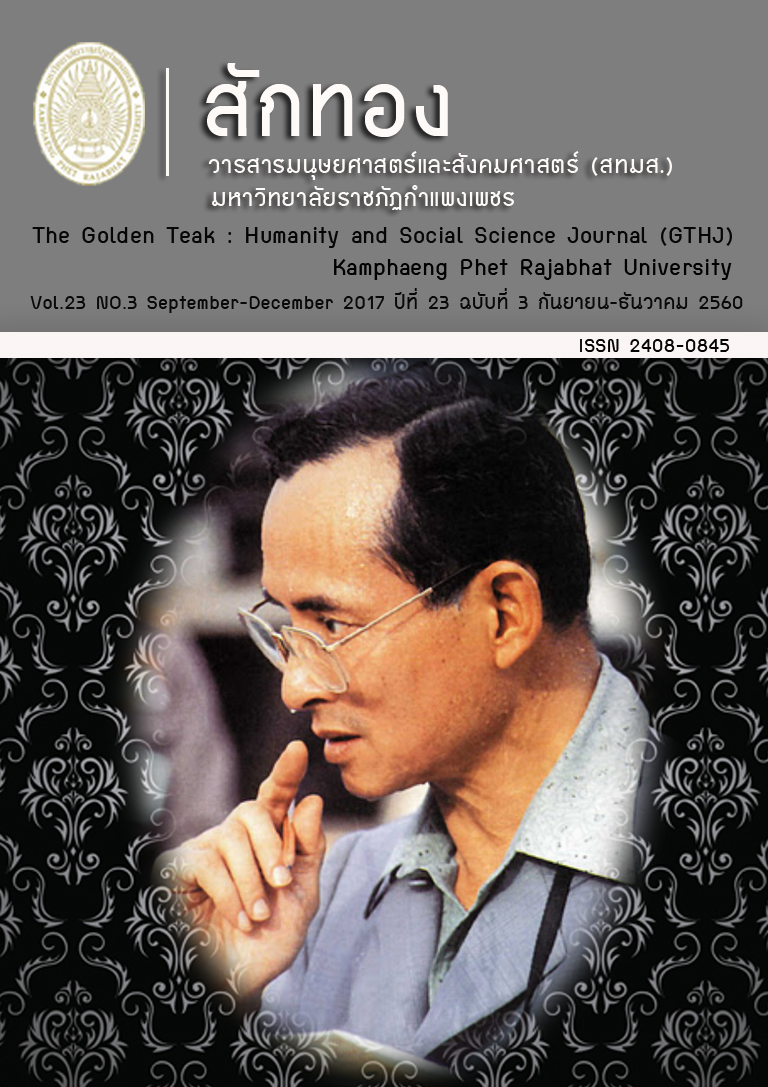บทบาทของครอบครัวในการดูแลผู้ป่วยเอดส์ ที่มารับการรักษาในคลินิกพิเศษ ATC โรงพยาบาลกำแพงเพชร
Main Article Content
Abstract
บทคัดย่อ
การวิจัยครั้งนี้เป็นการวิจัยเชิงสำรวจมีวัตถุประสงค์เพื่อศึกษาบทบาทของครอบครัวในการดูแลผู้ป่วยเอดส์ ที่มารับการรักษาในคลินิกพิเศษ ATC โรงพยาบาลกำแพงเพชร กลุ่มตัวอย่างจำนวน 255 คน โดยการสุ่มตัวอย่างจากทะเบียนผู้ป่วย ใช้วิธีการเลือกแบบง่าย เครื่องมือที่ใช้ในการศึกษาครั้งนี้ เป็น แบบสอบถามแบบมาตราส่วนประมาณค่า วิเคราะห์ข้อมูลโดยใช้สถิติได้แก่ จำนวน ความถี่ร้อยละค่าเฉลี่ยและส่วนเบี่ยงเบนมาตรฐาน ผลการวิจัยพบว่าครอบครัวมีบทบาทในการดูแลผู้ป่วยเอดส์ โดยรวมอยู่ในระดับสูง รวมทั้งสมาชิกในครอบครัวทุกๆคนมีบทบาทในการดูแลผู้ป่วยเอดส์ทุกด้าน ไม่แตกต่างกันเมื่อพิจารณารายด้านพบว่า 1) บทบาทการให้คำปรึกษาหรือให้คำแนะนำโดยรวมอยู่ในระดับปานกลาง โดยที่ครอบครัวห้ามปรามผู้ป่วยเรื่องบุหรี่ สุรา และ สิ่งเสพติดต่างๆและให้กำลังใจในการดำเนินชีวิตอยู่ในระดับสูง 2) บทบาทการให้ความช่วยเหลือสนับสนุนทางด้านจิตใจและสังคม โดยรวมอยู่ในระดับปานกลาง โดยคนในบ้านพูดคุย นั่งเล่นกับผู้ป่วยเพื่อไม่ให้รู้สึกว่า ถูกทอดทิ้ง อยู่ในระดับสูง 3) บทบาทให้ความช่วยเหลือทางด้านร่างกายและเมื่อเจ็บป่วยหรือมีปัญหาสุขภาพโดยรวมอยู่ในระดับสูง โดยคนในบ้านช่วยทำความสะอาดห้องนอนโดยใช้อุปกรณ์ป้องกันการติดเชื้อเช่นสวมถุงมือหรือถุงพลาสติกและใช้ผ้าปิดปาก จมูก อยู่ในระดับปานกลาง 4) บทบาทด้านการให้ความช่วยเหลือทางด้านเศรษฐกิจโดยรวมอยู่ในระดับสูง โดยคนในบ้านช่วยหางานให้เมื่อมีสุขภาพที่ดีขึ้นในระดับปานกลาง และ 5) บทบาทด้านการกระตุ้นส่งเสริมให้ผู้ป่วยดำรงชีวิตได้อย่างปกติโดยรวมอยู่ในระดับสูง โดยคนในบ้านให้ผู้ป่วยอยู่แต่ในบ้านไม่เปิดเผยตัวในหมู่บ้านหรือในงานประเพณีต่างๆอยู่ในระดับต่ำ
The Role of Family Members for supporting AIDS Patients in ATC Clinic KamphaengPhet Hospital
ABSTRACT
This was a survey research which aimed to study roles of family toward taking care of AIDS patients whom received service at a special clinic ATC, Kamphaengphet Hospital. 255 participants were randomly selected from patient records. The questionnaire, was createdfrom deliberate literature review. It was later categorizedin five sections which were 1) Roles of consultation or recommendation 2) Roles of mental and social support 3) Roles of physical support when needed 4) Roles of economic support and 5) Roles of encouraging patients to harmonize the routine daily life. The statistical method used in this study werefrequency, percentage, means and standard deviation.The study revealed that family played a crucial role a consultant or recommendation providers at the moderate level.Particularly, the issue of prohibiting from cigarette, alcoholic drinks and other addictive substances showed the high average score.Roles of mental and social supports were at average, The issues, however reached the high average, These were general conversation and spending time with participants in order to avoid a feeling of abandonment. For providing physical helps especially when their conditions got worse, the high level appeared except, the issue of bedroom cleansing with infection preventive equipment such as gloves and hygienic masks was at a moderate level. In aspect of economic supports, it revealed the high level of supports, apart from the issue of job seeking after recovering which was at the moderate level. Furthermore, patients were encouraged to live in a dailylifestyle, It was shown at the high level. Nevertheless, the issue of discouraging community or local festival participation was at a low level. In summary, the roles of family in taking care of AIDS patients were at high average and there was no significantly statistical difference among members in the family.
Article Details
บทความที่ได้รับการตีพิมพ์เป็นลิขสิทธิ์ของวารสาร สักทอง : วารสารมนุษยศาสตร์และสังคมศาสตร์ สถาบันวิจัยและพัฒนา มหาวิทยาลับราชภัฏกำแพงเพชร
ข้อคิดเห็นใดๆ ที่ปรากฎในวารสารเป็นวรรณกรรมของผู้เขียนโดยเฉพาะ ซึ่งมหาวิทยาลัยราชภัฏกำแพงเพชรและบรรณาธิการไม่จำเป็นต้องเห็นด้วย


